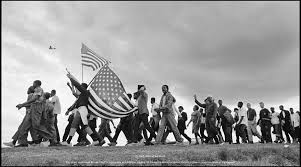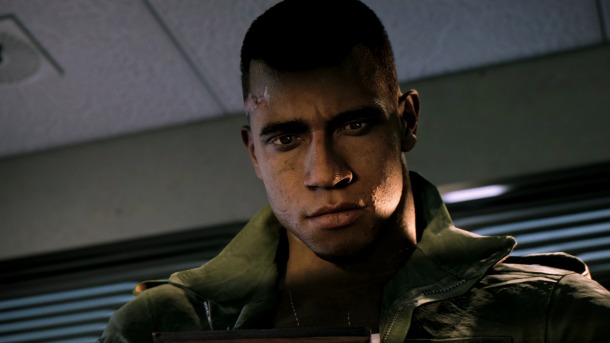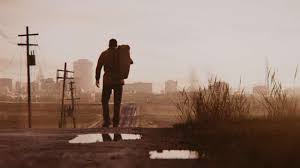Mafia 3 is an important game. It’s that simple. Weaving a story of revenge, the crippling effects of systemic racism and sexism, and a moving look into the state of America at the close of the 1960’s, Mafia 3 manages to give a more brutal, honest, and penetrating look into the soul of America in the 60’s and the greatest of its sins than any game that has come before it. This is a game about racism that is both direct and subtle.
Mafia 3 is brutal and unflinching in it’s look into racism and the near overwhelming way it found itself into every facet and institution of the Old South. Films and TV can of course tell powerful stories that open us to harrowing glimpses into that time and place, yet Mafia 3 is so effective for the simple reason that, I am Lincoln Clay.
No other medium can so effectively and powerfully place me in someone else’s shoes. Seeing someone in a film getting called heinous names and chased out of stores is far different than being the one getting screamed out and tailed by the police simply because of the color of your skin.
There is a feature of Mafia 3 that I haven’t seen too many people talk about, but that has stuck with me from almost the opening seconds. Any time you walk past a police officer their attention is drawn to you. They will begin to walk towards you, tell you to get a move on, and then follow you, keep an eye on you once you begin to walk away. Stay near them for too long and they very quickly become aggressive and confrontational.
This is an astounding gameplay design. There are many games where you play as a disgusting, ugly, horrible person. Many games where you play as someone who has committed horrible actions, see: every GTA release to date. There, the police are something to be concerned about only when committing the vicious acts of mayhem that so often occur in front of them. Yet, when you are simply walking the streets of Liberty City, San Andreas, or Vice City, the police pay no attention to you. They walk by, smile, and generally just go about their business. This is not the case in Mafia 3.
This hit me really hard and was coupled with another powerful gameplay feature, when a few hours into the game I decided to walk into a bar to go interrogate someone. I drove up to the bar in question and without thinking did the seemingly obvious thing, the thing that I have spent the past 24 years, both in real life and in video games doing: I walked through the front door and into the building.
Except I had forgotten one key detail. I am a white man in 2016, Lincoln Clay is a black man in the 1960’s deep South. In one instance, all hell broke loose.
I walked through the door, made it about three feet towards the guy I needed to talk to, when the owner of the bar was suddenly screaming for me to get the hell out of his place. I didn’t have a wanted level, I hadn’t committed any crimes, I had merely walked into his establishment.
I paid no attention and kept walking to my target. I got to about two feet from him before the owner came out from around the counter blocking me from going any further, got right in my face and started screaming racial slurs. I was understandably caught off guard. The other guests in the bar all started to turn and look at us, a few starting to walk over.
For a micro-second I thought they might intervene on my behalf, but a lifetime spent passionately studying history knew better; that wasn’t how this story went. Surely enough, a crowd surrounded me, and started to yell that I need to get out of this place right now. So I did. The owner called the cops anyway.
As I walked out and rounded the corner, thinking of a new way to go about talking to the man in the bar, I saw a cop walking towards me. This was still before I knew the full extent of the cops laser focus on Lincoln,so without thinking, I walked towards the cop. I got about two steps in before he noticed me, and screamed for me to, “get the hell outta here boy.” For the second time in less than a minute, I was caught off guard.
I walked back into the bar, got punched in the face, stumbled out, caught the police officer’s attention again, and at the same time the cops the owner had called had arrived, who were not very happy to see me. Meanwhile, a few bar patrons had come out after me. I was trapped between a rock and a hard place. Angry armed police on one hand, and racist, pissed, drunk patrons on the other. I had just wanted to talk to someone.
Mafia 3 takes place in 1968, one of the most pivotal, tumultuous, and chaotic years in American history. This is the year that Dr. Martin Luther King Jr. was killed, the year that Robert Kennedy was gunned down the night of his greatest political victory. This was the year of the Tet offensive and the beginning of the end in Vietnam, the year of the riots and chaos at the Democratic Convention, the year where George Wallace won 13 percent of the vote and five states on his pro segregation, anti-civil rights platform. This was the year where the great strides, progress, and hopes of the 1960’s ran headfirst into the hardnoise, pissed off, angry people who were terrified by just how much and how radically America had changed.

The Civil Rights Act, Fair Housing Act, and Voting Rights Act had all just been passed within the previous few years. Dr. King’s speech on the stairs of the Lincoln Memorial was still fresh in the public mind. Freedom Riders, the march on Selma, dogs getting set on people, JFK’s ideals and tragic death. The Cuban Missile Crisis, promise of equality for all, the beginning of the women’s movement, and the birth of the Social Safety Net. Change had come to America and while many celebrated it, a large portion of the country was concerned.
It’s this fear, this feeling and vibe within America that the world is coming undone, that “the good ol’ days” of America have come to an end, that Mafia 3 taps into so well, in the way that only video games really can: by letting me participate and experience it. The police come instantly when called in rich, up-scale, white neighborhoods, yet they may never come at all when called in Delroy Hollows, the black district of the city. I was followed, screamed out of stores, chased by police, and none of that got to me as much as the quiet but far more powerful accepted forms of racism. The way you are insulted and degraded in small talk with someone else. The way a husband pulls his wife away from you and to his other side when you walk by. The way that everyone has their eyes on you when you walk in a store. The simple, stark, and stunningly in-your-face message that is imparted when you see a “No Coloreds Allowed” sign in front of an establishment. It’s quiet, it’s sneaky, it’s subtle, but what it builds up to is a towering and suffocating noose of racism, that strangles and crushes so much out of you.
Lincoln Clay is angry; he’s mad at Sal Marcano for everything he’s done, but it’s more then that. His rampage through the city is that of a man, tired of getting kicked around, disrespected, and ignored for his whole life. The opening sections focus on the Dixie Mafia and the unrestrained fury with which you can go at them was a particularly compelling and a notable example. The Dixie Mafia is annihilated with the rage, fury, and pent-up feelings of a man who for years now has been kicked around or passed over even though he’s more skilled and smarter than everyone else in any room he’s in. It is the fury of a man who has been unable to do anything about this injustice and has had everything taken from him because of it and finally deciding to no longer put up with it.
Mafia 3 is a video game about the death of a southern mafia family in the 1960’s Deep South. It’s about slowly breaking the back of a family, picking off rackets, recruiting people to your side, and wonderfully distorts and pulls from much of the Mafia mythos, another excellent aspect of the game.
Yet, there is something far more to it then that. I doubt anyone will leave Mafia 3 without being astounded by how far the makers of this game pushed themselves to deliver a searing, unblinking, and in-your-face story on the injustice and brutality of the old south.
From the background conversations you hear walking the streets, to protests being organized, to the way that many of the white populace tries to fight back, to the most subtle and brilliant of all: a story that plays out over the radio of a white man shooting two unarmed black boys and the controversy over him getting away with it, something that is stunning in how relevant it is today. This is a game that is seeking to tell a far larger and more important story than one simply about the mob. Breathtaking, shocking, flawed, masterful in building real people and a living, breathing, troubled world in which they live, Mafia 3 is the year’s most important story in games, and now more than ever it’s one that should be told.







